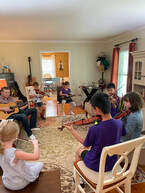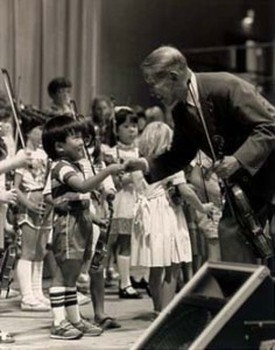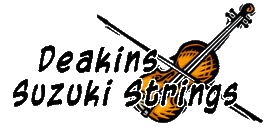Why choose Suzuki violin and fiddle instruction with Lisa?

"My son began violin lessons with Ms. Lisa two years ago, and I am so impressed with the progress he’s made. We don’t have to remind him to practice—he actually reminds us when it’s time to practice! Lisa includes movie music and fiddle tunes in her approach, which does wonders for keeping an active, busy 8-year-old interested in learning the violin."
---father of 8-year-old violinist
Introduction
Suzuki violin is a unique and exciting experience for your young child! All learning begins without printed music, and as the child progresses, music reading is incorporated as well. Children learn by listening and using small steps, and memory is developed in a gradual manner until it becomes a high skill. Young children have an almost uncanny ability to work in this manner; the "natural" manner of language learning. Suzuki students develop discipline and perseverance, strong bonds with their parents, confidence in front of a group, good stage presence, and a lifelong appreciation for music!
Suzuki students are exposed to the best of both worlds:
1. Learning music by ear
----Enables students to instantly play their favorite songs without any
written music needed
----Allows students to get creative and improvise their own melodies
and solos
2. Strong note reading skills
----Suzuki students perform highly in traditional orchestra settings,
including school orchestras and youth orchestras.
Parental Involvement
Do parents stay in the lessons with Suzuki students? Yes! Parents attend private and group lessons with their child and help their child practice at home. Parental involvement promotes consistency and efficiency in practice and offers the sharing of quality time together with mutual tasks and goals.
Listening
Young musicians learn best when they hear a piece of music and play it back, similarly to learning a language. We begin reading words after we are speaking a language, and Suzuki students begin reading music after they can play songs on the violin. Listening is a critical part of the Suzuki method, and students who are dedicated listeners have improved pitch, tone, and confidence in their playing. Suzuki violinists also show an increase in memory that helps with all of life’s skills as they grow. Click here to read more about the benefits of listening.
Alternative and Modern Styles
Students who participate in Deakins Suzuki Strings learn and play many different styles of music in addition to classical music. In today's changing musical world, it is essential that students learn about popular styles of music and improvisation. Lisa uses her experience in the bluegrass, folk, and country music industry combined with her classical training to teach children how to perform in a variety of musical situations. Students are not limited to performing in orchestras and classical ensembles---they can play in church worship bands, bluegrass bands, jazz ensembles, and even jam with their friends in a rock band!
Studio Jams
As students progress and develop their skills in the Suzuki program, they will have the opportunity to attend studio jams! In these jams, students learn how to play tunes with others in a relaxed atmosphere where they can experiment, be creative, and grow as musicians. Lisa and her husband Derek, also a Nashville musician, provide students with a unique and rare opportunity to learn from professionals and play with friends who share a passion for music.
Group Lessons and Activities
In addition to weekly private lessons, you and your child will have the privilege of attending weekly group lessons with other students of varied ability levels. In Lisa's group lessons, students will review music vocabulary, refine skills, work and play together, and develop leadership skills. Meeting together in groups is a unique and fun aspect of the Suzuki method and a great motivator for young musicians! Lisa also offers a summer violin "camp" experience for her students as well as additional community performances throughout the year. To read more about the benefits of group lessons, click here.
College and Beyond
Students who begin playing the violin at a young age and continue playing through high school may be eligible to receive scholarships to play in their college's orchestra, regardless of their major! What a great way to meet new people with similar interests.
Because of the Suzuki philosophy's strong emphasis on learning by ear and Lisa's vast knowledge of various styles of music, Suzuki students who participate in Deakins Suzuki Strings also have opportunities to play in non-traditional groups when they get older, including bluegrass bands, church worship bands, popular music groups, jazz ensembles, and more!
Playing the violin is a timeless skill and allows for endless enjoyment. Long after organized sports and other activities are over, violinists can continue to make music well into their adult years. Playing the violin will be something that students can share with their own children and grandchildren in the future.
The Suzuki Legacy
Dr. Shinichi Suzuki was a violinist, educator, philosopher, and humanitarian. Born in 1898, he studied violin in Japan and Germany, and after the end of World War II, he devoted his life to the development of the method he calls Talent Education. Dr. Suzuki based his approach on the belief that “musical ability is not an inborn talent but an ability which can be developed. Any child who is properly trained can develop musical ability, just as all children develop the ability to speak their mother tongue. The potential of every child is unlimited.”
Dr. Suzuki’s goal was not simply to develop fine musicians, but to nurture loving human beings and help develop each child’s character through the study of music.
---father of 8-year-old violinist
Introduction
Suzuki violin is a unique and exciting experience for your young child! All learning begins without printed music, and as the child progresses, music reading is incorporated as well. Children learn by listening and using small steps, and memory is developed in a gradual manner until it becomes a high skill. Young children have an almost uncanny ability to work in this manner; the "natural" manner of language learning. Suzuki students develop discipline and perseverance, strong bonds with their parents, confidence in front of a group, good stage presence, and a lifelong appreciation for music!
Suzuki students are exposed to the best of both worlds:
1. Learning music by ear
----Enables students to instantly play their favorite songs without any
written music needed
----Allows students to get creative and improvise their own melodies
and solos
2. Strong note reading skills
----Suzuki students perform highly in traditional orchestra settings,
including school orchestras and youth orchestras.
Parental Involvement
Do parents stay in the lessons with Suzuki students? Yes! Parents attend private and group lessons with their child and help their child practice at home. Parental involvement promotes consistency and efficiency in practice and offers the sharing of quality time together with mutual tasks and goals.
Listening
Young musicians learn best when they hear a piece of music and play it back, similarly to learning a language. We begin reading words after we are speaking a language, and Suzuki students begin reading music after they can play songs on the violin. Listening is a critical part of the Suzuki method, and students who are dedicated listeners have improved pitch, tone, and confidence in their playing. Suzuki violinists also show an increase in memory that helps with all of life’s skills as they grow. Click here to read more about the benefits of listening.
Alternative and Modern Styles
Students who participate in Deakins Suzuki Strings learn and play many different styles of music in addition to classical music. In today's changing musical world, it is essential that students learn about popular styles of music and improvisation. Lisa uses her experience in the bluegrass, folk, and country music industry combined with her classical training to teach children how to perform in a variety of musical situations. Students are not limited to performing in orchestras and classical ensembles---they can play in church worship bands, bluegrass bands, jazz ensembles, and even jam with their friends in a rock band!
Studio Jams
As students progress and develop their skills in the Suzuki program, they will have the opportunity to attend studio jams! In these jams, students learn how to play tunes with others in a relaxed atmosphere where they can experiment, be creative, and grow as musicians. Lisa and her husband Derek, also a Nashville musician, provide students with a unique and rare opportunity to learn from professionals and play with friends who share a passion for music.
Group Lessons and Activities
In addition to weekly private lessons, you and your child will have the privilege of attending weekly group lessons with other students of varied ability levels. In Lisa's group lessons, students will review music vocabulary, refine skills, work and play together, and develop leadership skills. Meeting together in groups is a unique and fun aspect of the Suzuki method and a great motivator for young musicians! Lisa also offers a summer violin "camp" experience for her students as well as additional community performances throughout the year. To read more about the benefits of group lessons, click here.
College and Beyond
Students who begin playing the violin at a young age and continue playing through high school may be eligible to receive scholarships to play in their college's orchestra, regardless of their major! What a great way to meet new people with similar interests.
Because of the Suzuki philosophy's strong emphasis on learning by ear and Lisa's vast knowledge of various styles of music, Suzuki students who participate in Deakins Suzuki Strings also have opportunities to play in non-traditional groups when they get older, including bluegrass bands, church worship bands, popular music groups, jazz ensembles, and more!
Playing the violin is a timeless skill and allows for endless enjoyment. Long after organized sports and other activities are over, violinists can continue to make music well into their adult years. Playing the violin will be something that students can share with their own children and grandchildren in the future.
The Suzuki Legacy
Dr. Shinichi Suzuki was a violinist, educator, philosopher, and humanitarian. Born in 1898, he studied violin in Japan and Germany, and after the end of World War II, he devoted his life to the development of the method he calls Talent Education. Dr. Suzuki based his approach on the belief that “musical ability is not an inborn talent but an ability which can be developed. Any child who is properly trained can develop musical ability, just as all children develop the ability to speak their mother tongue. The potential of every child is unlimited.”
Dr. Suzuki’s goal was not simply to develop fine musicians, but to nurture loving human beings and help develop each child’s character through the study of music.


